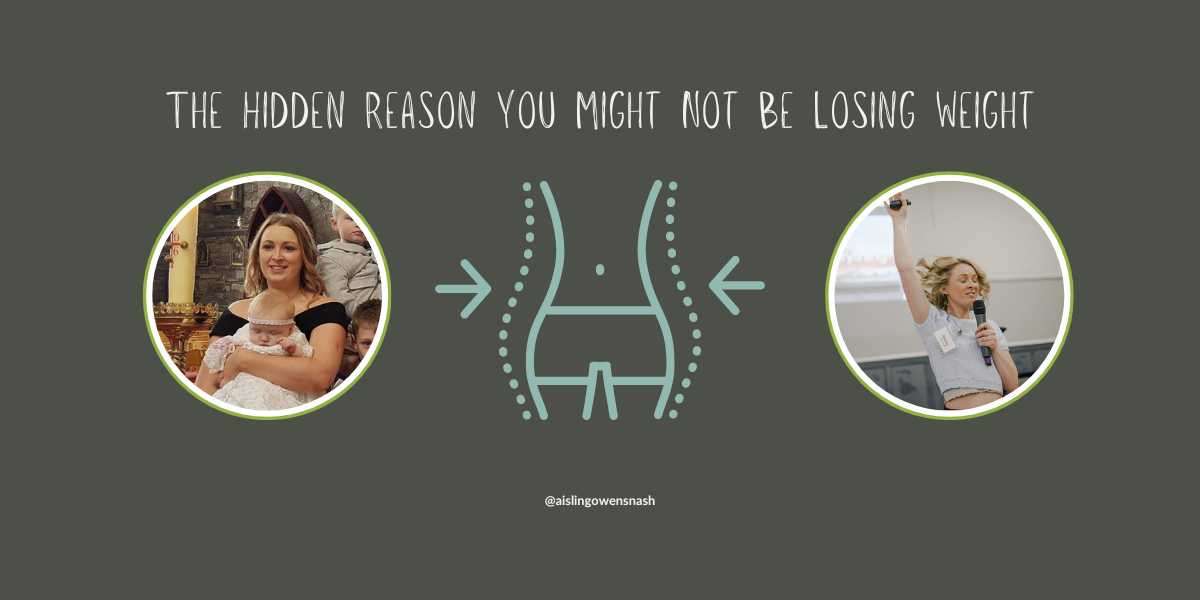The Hidden Reason You Might Not Be Losing Weight
"But I don't even eat that much food, I don't understand why I can't lose weight!" This is something I hear frequently, especially from women. While losing weight is often perceived as the key to feeling better about ourselves, the real issue often lies deeper. I encourage you to focus on feeling better within yourself and being kind to yourself first. Let's explore why eating less might not be the solution you think it is.
The Starvation Mode Myth (major calorie deficits!)
Did you know that when you don’t eat enough, your body believes it's starving?
As a survival mechanism, it slows down your metabolism to conserve energy (Busch, 2017). This means your body starts storing extra fat instead of burning it, making weight loss even harder.
Here’s another sad statistic for you research indicates that 95% of people who diet and lose weight, will gain all of the weight back, and more, within a year after stopping the diet (Institute for the Psychology of Eating, 2014). With statistics like this is it any wonder that people give up and opt for unsafe methods to lose weight with pills and other riskier ways to lose weight long term?
Why Does This Happen? Why Do I Gain Weight or Only Lose 2lbs When I Diet?
When you drastically cut your calorie intake, your body perceives it as a threat to your survival. This triggers a response known as "starvation mode," where your body begins to conserve energy to protect itself. Here’s a closer look at why this happens:
- Metabolic Slowdown: When your body gets fewer calories than it needs, it starts to conserve energy by slowing down your metabolism. This means your body burns fewer calories at rest, making it harder to lose weight. Even everyday activities burn fewer calories because your body becomes more efficient at using the limited energy it receives.
- Fat Storage: In starvation mode, your body prioritises fat storage to ensure it has enough energy reserves to survive. This is a natural survival mechanism that dates back to ancient times when food scarcity was common. As a result, instead of burning fat for energy, your body holds onto it, leading to minimal weight loss or even weight gain despite your efforts.
- Muscle Loss: To further conserve energy, your body may start breaking down muscle tissue for fuel. Muscle mass is metabolically active, meaning it burns more calories than fat. Losing muscle can further reduce your metabolic rate, making it even harder to lose weight.
- Hormonal Changes: Dieting can also cause changes in your hormone levels. For example, levels of the hormone leptin, which helps regulate appetite and metabolism, can decrease. This can increase your hunger and cravings, making it difficult to stick to your diet. Additionally, cortisol levels can rise, which is associated with increased fat storage, particularly around the abdomen.
- Adaptive Thermogenesis: This is a process where your body adjusts its energy expenditure based on calorie intake. If you reduce your calorie intake significantly, your body adapts by reducing the number of calories it burns during activities and at rest. This makes it harder to lose weight and easier to gain weight once you start eating more normally again.
- Rebound Weight Gain: Once you stop dieting and return to a more regular eating pattern, your body might rapidly regain weight. This is because the lowered metabolic rate from dieting means you're now consuming more calories than your body needs, leading to weight gain. This cycle of dieting and gaining weight is often referred to as "yo-yo dieting."
Understanding these factors can help explain why simply eating less isn't always the best strategy for weight loss. Instead, focusing on a balanced diet, regular physical activity, and a healthy lifestyle can support sustainable weight management and overall well-being and this is what I guide people through in my Glow Up each month. We have new ladies joining us every Monday!
The Importance of Eating Enough!
To avoid this, it’s crucial to ensure you’re eating enough to support your body’s needs. Instead of drastically cutting calories, focus on nourishing your body with balanced meals that provide the energy and nutrients you need. Initially, when I start working with my gorgeous clients they are shocked that I am telling them to eat more food! But, the difference is we’re focused on eating the right types of foods in volume. We don’t track calories- we track energy, focus, sleep quality, mood and how we feel in our clothes!
What can you do to build long-term sustainable weight management into your lifestyle?
If you’re struggling with your weight and suspect you might not be eating enough, here are some steps you can take:
Eat more food: you can start by simply beginning to add in more varieties of fruits, veggies and healthy fats alongside a smaller portion of lean meat daily and try to reduce caffeine and sugar intake.
Seek Support: Reach out to me for free access to my app, where you can find recipes, tips and guidance on healthy eating and weight management.
Read My Blog: Get more insights and advice from my blog, where I cover various topics related to health and wellness.
Self-Assessment: Fill out my self-assessment form so I can make bespoke recommendations tailored to your needs including recipe guides, nutrition support pack, community support and guidance.
Remember, the goal is to feel better in yourself and be kind to your body. Weight loss will follow as a natural consequence of taking good care of yourself. If you need support on this journey, don’t hesitate to get in touch.
Let’s work together to achieve a healthier, happier you. Contact me for personalised advice and start your journey towards better health today. That may look like a book recommendation, a blog, a podcast, a connection or one of my plans or products.
Aisling x








